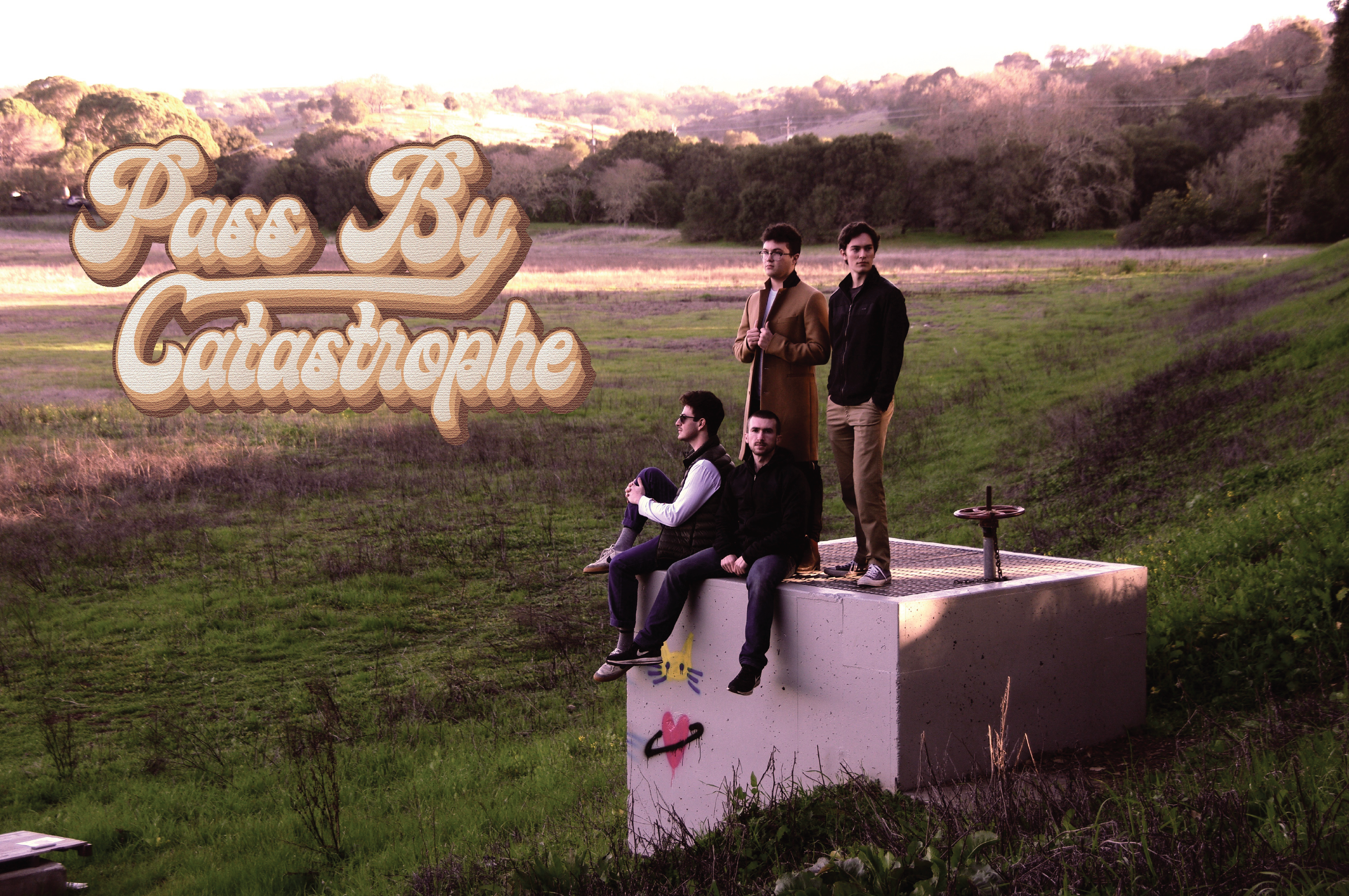To “pass by catastrophe,” according to urban legend, you must experience a major earthquake or other catastrophic event during your final exam warranting the university registrars to give everyone passing grades. But in the case of the Stanford band, “Pass By Catastrophe,” the phrase means exploring making music together and dropping your first extended play (EP) on Oct. 4, amidst the Stanford grind.
That Pass By Catastrophe is, as singer-songwriter and guitarist Max Kilberg ’21 puts it, a “sum of its parts” becomes truly apparent from hearing the band’s origin story in tandem with their new EP. Although all four members have come from different academic backgrounds — ranging from economics and the environmental sciences to communication and film studies — their EP release exemplifies how they have bridged their different experiences as student-musicians to create a noteworthy new groove.
The idea of starting a band emerged out of the close friendship between Max and lead singer Dexter Simpson ’21 as frosh hallmates in Twain. Max had come to Stanford “raised on a heavy diet of classic rock” with a strong background in guitar and song-writing, and knew he wanted to find people to “do music things” with him on campus. Dexter similarly pursued many different music groups as a frosh, employing his musical theater and classical vocal training as a Mendicant, lead member of Gaieties 2017 and member of the Brass Acid Collective. Max fondly recalls when he and Dexter performed acoustic covers of rap songs for their frosh dorm friends. He credits dorm Cafe Nights for inspiring them to form a band and getting involved with a recording studio as sophomores.
Max and Dexter first met their future guitarist and bassist Zach Plante (’18, Dartmouth) at a Soaked Oates concert on campus. Zach has proved invaluable to the band thanks to his considerable experience playing with the Dartmouth college band Winterhill and his familiarity with sound engineering and studio recording from recording an EP. Through Zach, Max and Dexter got in touch with the band’s drummer and pianist Sam Silverman ’21, who played for a variety of on-campus ensembles as a frosh but was also taking classes in theory and orchestration as a music minor.
Though Pass By Catastrophe started as four college guys jamming out together during winter quarter, between the exhilaration of performing and Zach’s studio recording experience, the group set their sights on recording an EP. The band met their producer by chance when they first visited Hyde Park Studios in San Francisco. Their future producer Chris Marquez, who worked as a sound engineer at the studio at the time of their visit, initially showed them the equipment and space. Max recalls how they all immediately vibed with the historic recording studio thanks to the Grateful Dead posters plastered on the walls and the fact that Kanye West himself just one week before had sat in the same studio chair as them.
When Marquez sat down with the band to discuss their music Max recalls how he “really liked their sound” and offered to help them mix and produce their tracks. The band thus geared up in spring quarter to record their full EP with the goal of balancing and recording their EP in as few as one recording session. A typical week for Pass By Catastrophe saw them meeting at least twice to rehearse both cover and original songs, perform at an on-campus gig or prepare for studio recording at the Roble Arts Gym.
Max thoughtfully explained how the themes of Pass By Catastrophe’s debut EP are both the experience of embracing the chaos of life and the dreamy nostalgia of growing up in the American suburbs and moving out to California. The sound of Pass by Catastrophe is driven by classic rock guitar riffs and Dexter’s bluesy vocals, as if an acknowledgement of the diversity of musical and life experiences that brought each band member to out west to Stanford campus.
The band members are all interested in melding social criticism with musical vibes that draw upon everything from classic rock and modern pop (think Coldplay and the Kooks) to jazz and blues. The nostalgic rock vibes of the group have clearly gained traction with the public, as the three tracks on the EP have already garnered thousands of plays on Spotify in the week or two since their release. The song “Pretty Lady” holds a special importance in the group’s heart as its “bop” due to a powerful memory while recording it in the studio. Max reminisces how the group had been initially unsure about whether to record the song. After Zach laid down the piano track and it was transformed by an organ patch and back-up vocal accompaniment, the group realized how much potential their music had.
When asked what the future holds for the group, Sam notes that the group intends to play several gigs at and beyond the scope of Stanford in celebration of their EP. Some Stanford students may have heard them at their release party this past Friday but others can tune into KSZU at 8 p.m. this Wednesday, Oct. 16 to hear them play live on air. The group plans on venturing out to gigs in Menlo Park, Palo Alto and San Francisco as well as developing new tracks. If almost four thousand Spotify plays of “Pretty Lady” within the past ten days is any indication, this band of student-musicians is right on track for achieving their goal of “making music for and by everyone.”
Contact Natalie Francis at natfran ‘at’ stanford.edu.
